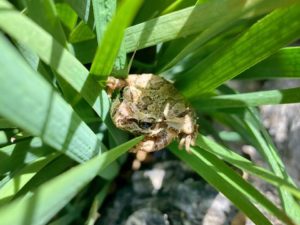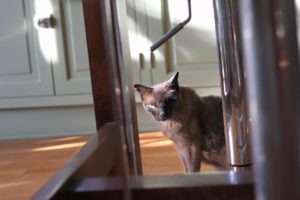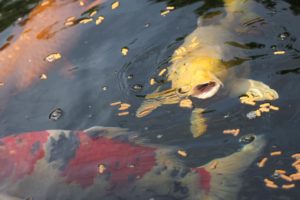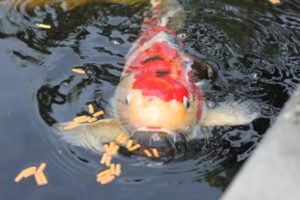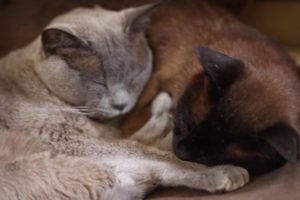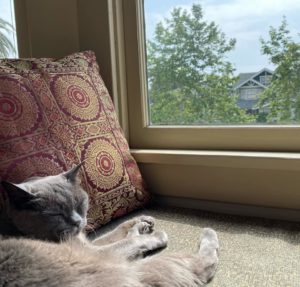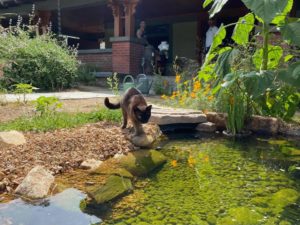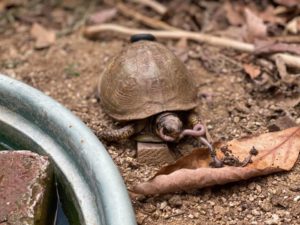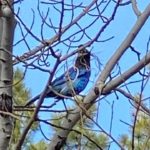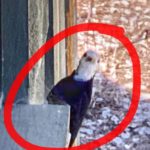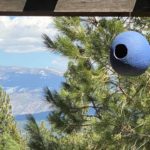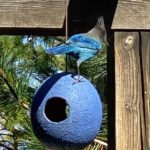Truckee, California
I was disappointed to learn this week that the bright blue birds circling our house in Truckee as if they own the place aren’t in fact the blue jays familiar to me from my childhood in Kansas City. They are Steller’s jays, a totally different and inferior species. But this is hardly where my disappointment in these creatures ends. Let me first say to the numerous Steller’s jays I can see from my window right now, you should by happy you can’t connect to the Internet because you wouldn’t like what people are saying about you. Words like “raspy,” “pesky,” and “pigeon-sized” are ones you’d have to grapple with. Sure, compared to blue jays you have longer legs and a more slender bill, but from what I’ve seen that comparison is charitable at best.
I’ve been watching these guys every morning and afternoon fly around with twigs in their bills trying to rebuild a nest left over from last year on an outdoor speaker, and I’m not very impressed. To be perfectly blunt, I don’t think it’s that difficult of a task. Twigs are easy to find in the forest (go figure) and it’s not like these jays have anything else to do, especially given that we cater all of their meals. Why then is the nest still such a disaster, with twigs raining down onto the ground? But god love these jays, they keep bringing more twigs.
By contrast, the white-headed woodpecker is a bird to admire. Unlike the messed up paint job that passes for a Steller’s jay, these woodpeckers are stunning, with sleek black bodies and white heads. The male woodpecker I’m currently at loggerheads with has a bright red spot on its head. With those looks he could get away with anything, and he knows it. Every afternoon, when we are obviously trying to work from home, this little narcissist hammers away thoughtlessly on the side of the house … really loudly. The first time this happened I poked my head out the bathroom window and not three feet away this woodpecker turns his head and just stares at me, as if to say, “is there something I can help you with?” My clear recollection is that he had reading glasses and uttered these words condescendingly over the top of them. What really unnerved me about this staring contest was that I had to look away first! The numerous deep holes in the side of the house are a tribute to this bird’s industriousness. The Steller’s jays still haplessly trying to stitch together a simple nest should be taking notes.
I joke with Steller’s jays because we have that kind of rapport. The truth is, other than the stark reminder of a surreal year at home gone by, we’re happy to see them back. Last year when COVID-19 blessed us with plenty of free time, we first noticed nests around the house and watched the jays circle the trees and deliver food to the chicks . . . until one day when the commotion stopped and the nests were empty. This year, there’s a new level of comfort. They don’t fly away or make “raspy” noises when we go outside, and they fly low over our heads to the nest.
In the survival category, animals take most of the top prizes. Ecco is a senior dog I only know from a friend’s post on Facebook. “Today,” the April 5th post said, “I did something I’ve been wanting to do for a long time. I adopted a senior dog that had been abandoned by its owners.” When Ecco first met his new owner (read, hero), he apparently jumped into the trunk of the car and was so scared he wouldn’t come out. Heartbreaking. But at home hours later Ecco was snoring away on his new dog bed. And then a few days later a new post: life at home with Ecco “is now a series of walks to see new vistas, naps and meals to recharge, and reminders to sit and smell the breeze.”
Our dog Harvey lived the early years of his life dedicated to balls and sticks and swimming and running. But his body betrayed him and he had surgery on both of his back knees. A few years later he got off the couch to find he couldn’t walk. That led to another surgery, this time on his spine, and more extended confinement at home. But even though we know he lives in pain, Harvey is always game for whatever we will allow him to do. He’d swim until he sank if we let him.
After losing the things they love, dogs experience fear and pain, just like we do. But they don’t waste a moment. “This is my life now.”
It will be 5:00 here soon and time to pack up the car. I know this because Harvey has risen from his cushy bed to start angling for dinner—always like clockwork. Outside he finishes his food and takes a rambling walk around the patio, no longer bothering to notice the jays busily finishing their nests as the wind picks up. Personification is a poet’s trick to ascribe human qualities to nonhumans. What is it called when a human aspires to the traits of animals, in this case, their perseverance?
